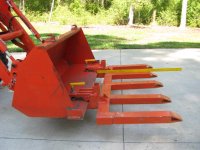kenlip
Silver Member
- Joined
- Nov 3, 2017
- Messages
- 222
- Location
- NSW Australia
- Tractor
- Kubota MX5100 with Challenge FEL and 4:1
Tractor bought for use on hilly 'weekender' property, primarily to take care of the roads. Not lifting any hay bales.
Tractor is MX5100
Challenge loader
Lift capacity at pivot pin - Ground level 1490kg
Lift capacity at pivot pin - Maximum lift height 1242kg
Lift capacity at 800mm from pivot pin - Ground level 1350kg
Lift capacity at 800mm from pivot pin - 1.5m lift height 1306kg
Lift capacity at 800mm from pivot pin - Maximum lift height 900kg
Bucket rollback force at ground height 1000kg
Has 4:1 bucket
The dealer is strongly advocating these forks: http://www.cih.com.au/index.php?option=com_k2&view=item&id=56:pallet-fork&Itemid=106
Floating
Weight (with no fork arms) 105kg
Width 1105mm-1250mm
Fork arm length 1075mm
Fork arm weight (single) 44kg
Fork arm maximum load (pair) 2500kg
Tine spacing Minimum Maximum
675mm 1225mm
I questioned the reasoning behind suggesting 2,500kg forks when the loader can't handle anywhere near that sort of load.
His answer is that the arms are significantly stronger and this helps to prevent bent arms.
I am an 'over-engineering' kinda guy, but my BS monitor shot way up into the red zone when I heard that explanation. However, I know very little about pallet forks and have zero experience with them, so I am deferring to my learned and experienced colleagues on this forum for your opinions.
Tractor is MX5100
Challenge loader
Lift capacity at pivot pin - Ground level 1490kg
Lift capacity at pivot pin - Maximum lift height 1242kg
Lift capacity at 800mm from pivot pin - Ground level 1350kg
Lift capacity at 800mm from pivot pin - 1.5m lift height 1306kg
Lift capacity at 800mm from pivot pin - Maximum lift height 900kg
Bucket rollback force at ground height 1000kg
Has 4:1 bucket
The dealer is strongly advocating these forks: http://www.cih.com.au/index.php?option=com_k2&view=item&id=56:pallet-fork&Itemid=106
Floating
Weight (with no fork arms) 105kg
Width 1105mm-1250mm
Fork arm length 1075mm
Fork arm weight (single) 44kg
Fork arm maximum load (pair) 2500kg
Tine spacing Minimum Maximum
675mm 1225mm
I questioned the reasoning behind suggesting 2,500kg forks when the loader can't handle anywhere near that sort of load.
His answer is that the arms are significantly stronger and this helps to prevent bent arms.
I am an 'over-engineering' kinda guy, but my BS monitor shot way up into the red zone when I heard that explanation. However, I know very little about pallet forks and have zero experience with them, so I am deferring to my learned and experienced colleagues on this forum for your opinions.

